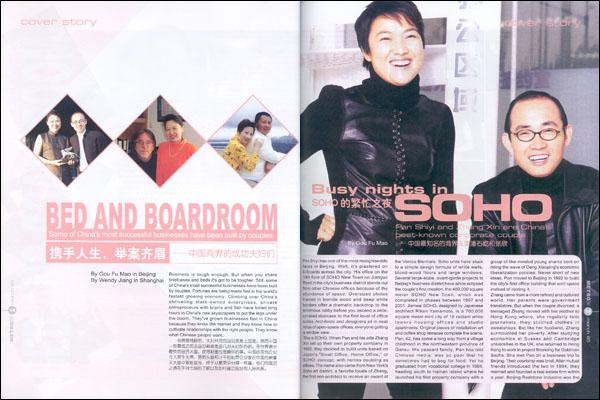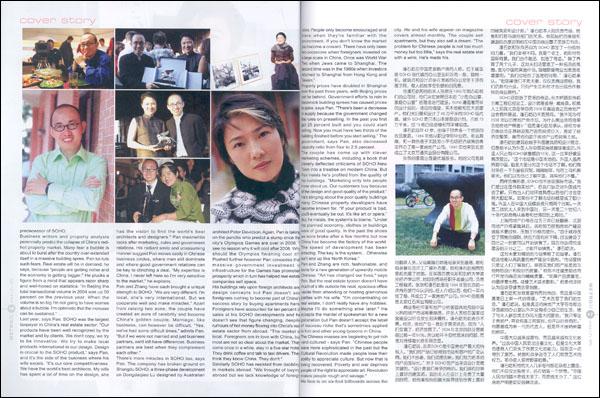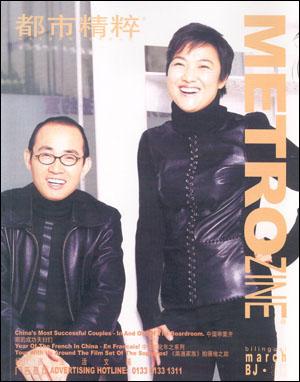Business is tough enough. But when you share briefcases and beds it's got to tougher. Still, some of China's most successful businesses have been built by couples. Fortunes are being made fast in the world's fastest growing economy. Climbing over China's shriveling state-owned enterprises, private entrepreneurs with brains and flair have toiled long hours in China's new skyscrapers to put the legs under the boom. They've grown businesses fast in China because they know the market and they know how to cultivate relationships with the right people. They know what Chinese people want.
Busy nights in SOHO
Pan Shiyi and Zhang Xin are China's best-known corporate couple

Pan Shiyi has one of the most recogniseable faces in Beijing. Well, it's plastered on billboards across the city. His office on the 18th floor of SOHO New Town on Jianguo Road in the city's business district stands out from other Chinese offices because of the abundance of space. Oversized photos framed in blonde wood and deep white borders offer a dramatic backdrop to the enormous lobby before you ascend a wide, unrailed staircase to the first level of office suites. Architects and designers sit in neat strips of open-space offices, everyone getting a window view.
This is SOHO. When Pan and his wife Zhang Xin set up their own property company in 1995, they decided to build units based on Japan's "Small Office, Home Office," or SOHO, concept, with homes doubling as offices. The name also came from New York's Soho art district, a favorite locale of Zhang, the first non-architect to receive an award at the Venice Biennale. Soho units have stuck to a simple design formula of white walls, blond-wood floors and large windows. Several large-scale, avant-garde projects in Beijing's business district have since eclipsed the couple's first creation, the 480,000 square meter SOHO New Town, which was completed in phases between 1997 and 2001. Jianwai SOHO, designed by Japanese architect Riken Yamamoto, is a 700,000aquare meter mini city of 18 radiant white towers housing offices and studio apartments. Original pieces of installation art and coffee shop terraces complete the scene. Pan, 42, has come a long way from a village childhood in the northwestern province of Gansu. His peasant family, Pan has told Chinese media, was so poor that he sometimes had to beg for food. Yet he graduated from vocational college in 1984, heading south to Hainan Island where he launched his first property company with a group of like-minded young sharks bent on riding the wave of Deng Xiaoping's economic liberalization policies. Never short of new ideas, Pan moved to Beijing in 1992 to build the city's fist office building that sold space instead of renting it.
Zhang came from a more refined and cultured world. Her parents were government translators. But when the couple divorced, a teenaged Zhang moved with her mother to Hong Kong where, she regularly tells journalists. they stitched clothes in sweatshops. But like her husband, Zhang surmounted her poverty. After studying economics at Sussex and Cambridge universities in the UK, she returned to Hong Kong to work in project financing for Goldman Sachs. She met Pan on a business trip to Beijing. Their courtship was brief. After mutual friends introduced the two in 1994, they married and founded a real estate firm within a year. Beijing Redstone Industrie was the predecessor of SOHO.

Business writers and property analysts perennially predict the collapse of China's red-hot property market. Many fear a bubble is about to burst after the country over-extended itself in a massive building spree. Pan tut-tuts such fears. Real estate will be in demand. he says, because" people are getting richer and the economy is getting bigger." He plucks a figure from a mind that appears razor sharp and well-honed on statistics:" In Beijing the total transactional volume in 2004 was to 50 percent on the previous year. When the volume is so big I'm not going to have worries about a bubble. I'm optimistic that the increase can be sustained."
Last year, says Pan, SOHO was the largest taxpayer in China's real estate sector. "Our products have been well recognized by the market and by clients. We don't copy, we try to be innovative. We try to make local products international in our design. Design I crucial to the SOHO product," says Pan. and it's the side of the business where his wife excels " It's our core competitiveness. We have the world's best architects. My wife has spent a lot of time on the design, she has the vision to find the world's best architects and designers." Pan meanwhile looks after marketing, sales and government relations. His radiant smile and unassuming manner suggest Pan moves easily in Chinese business circles, where men still dominate and where good government relations can be key to clinching a deal. "My expertise is China. I never left here so I'm very sensitive to the market "he explains.
Pan and Zhang have each brought a unique strength to SOHO "We are very different. I'm local, she's very international. But we cooperate well and make miracles." Apart from raising two sons, the couple have created and aura of celebrity and become China's golden couple. Marriage, like business can however be difficult. "Yes, we've had some difficult times," admits Pan. "But if we were not married and just business partners, we'd still have differences. Business partners are best when they complement each other."
There's more miracles in SOHO too, says Pan. The company has broken ground on Shangdu SOHO, a three-phase development on Dongdaqiao Lu designed by Australian architect Peter Davidson. Again, Pan is taking on the pundits who predict a slump once the city's Olympics Games are over in 2008." See no reason why it will cool after 2008. why should the Olympics finishing cool it?" Pushed further however Pan concedes that massive government investment in infrastructure for the Games has promote prosperity which in turn has helped real estate companies sell space. His buildings rely upon foreign architects and design concepts but Pan doesn't see foreigners rushing to become part of China's success story by buying apartments here Foreigners have accounted for ten percent of sales at his SOHO developments and he doesn't see that figure changing, despite rumours of hot money flowing into China's real estate sector from abroad. "The market is local. Foreigners are in love with China, but most are not so clear about the market. The come once in a while, stay in a five star hotel. They drink coffee and talk to taxi drivers. They think they know China. They don't."
 Similarly SOHO has resisted from dabbling in markets abroad. "We thought of buying abroad but we lack knowledge of foreign cities. People only become encouraged and brave when they're familiar with the environment. If you don't know the market you become a coward. There have only been two occasions when foreigners invested on a large scale in China. Once was World War Two when Jews came to Shanghai. The second time was in the 1980s when investors returned to Shanghai from Hong Kong and Taiwan."
Similarly SOHO has resisted from dabbling in markets abroad. "We thought of buying abroad but we lack knowledge of foreign cities. People only become encouraged and brave when they're familiar with the environment. If you don't know the market you become a coward. There have only been two occasions when foreigners invested on a large scale in China. Once was World War Two when Jews came to Shanghai. The second time was in the 1980s when investors returned to Shanghai from Hong Kong and Taiwan."Property prices have doubled in Shanghai over the past three years, with Beijing prices not far behind. Government efforts to rein in breakneck building sprees has caused prices to spike, says Pan. "There's been a decrease in supply because the government changed the rules on preselling. In the past you first got 25 percent built and you could start selling. Now you must have two thirds of the building finished before you start selling." The government, says Pan, also decreased capacity ratio from four to 2.5 percent.
The couple has come up with clever marketing schemes, including a book that cleverly deflected criticisms of SOHO New Town into a treatise on modern China. But Pan insists he's profited from the quality of his buildings. "Marketing only lets people know about us. Our customers buy because of the design and good quality of the product." He's stinging about the poor quality buildings many Chinese property developers have become known for. "If your product is bad, you'll eventually be out. It's like art or opera." But, he insists, the system's to blame. "Under the planned economy, clothes or buildings were of good quality. In the past the past the shoes we wore broke after a few months but now China has become the factory of the world. The speed of development has been amazing. The key is the system Otherwise we'll end up like North Korea."
Pan and Zhang are rich, fashionable, and icons for a new generation of upwardly mobile Chinese. "Art has changed our lives," says Pan. But the real estate tycoon doesn't have much of a life outside his neat. Spacious office-aside from attending or hosting glamorous parties with his wife. "I'm concentrating on real estate. I don't really have any hobbies. Maybe I'll do something else later." He accepts the mantel of spokesman for a new generation but Pan doesn't accept the label of nouveau riche that's sometimes applied to him and other young tycoons in China.
The Chinese masses are beginning to get rich-and cultured - says Pan. "Chinese people were more sophisticated in the past but the Cultural Revolution made people lose their ability to appreciate culture. But now that is being recovered. Poverty and war deprives people of the right to appreciate art. Revolution makes people rough and savage."
His face is on six-foot billboards across the city. He and his wife appear on magazine covers almost monthly. The couple sell apartments, but they also sell a dream. "The problem for Chinese people is not too much money but too little." says the real estate star with a wink. He's made his.





